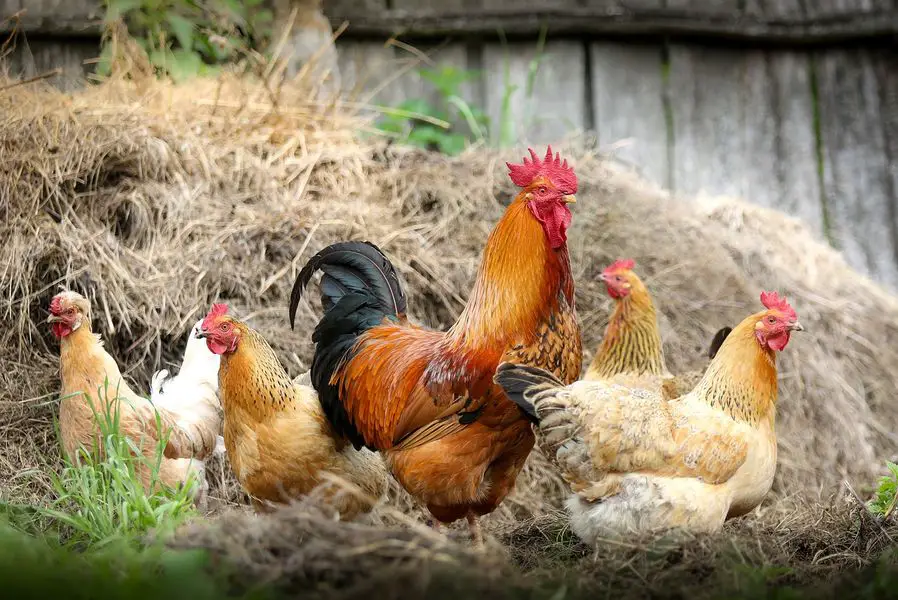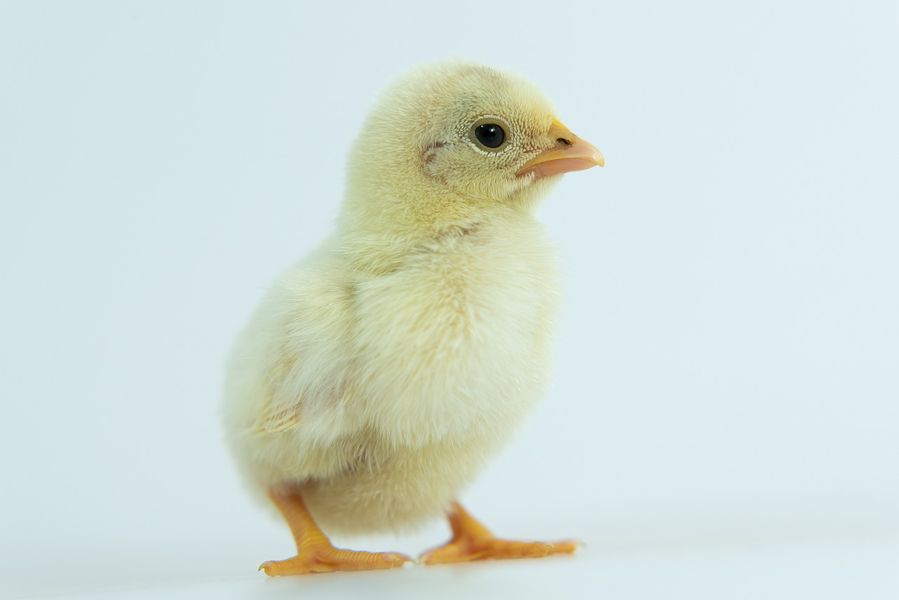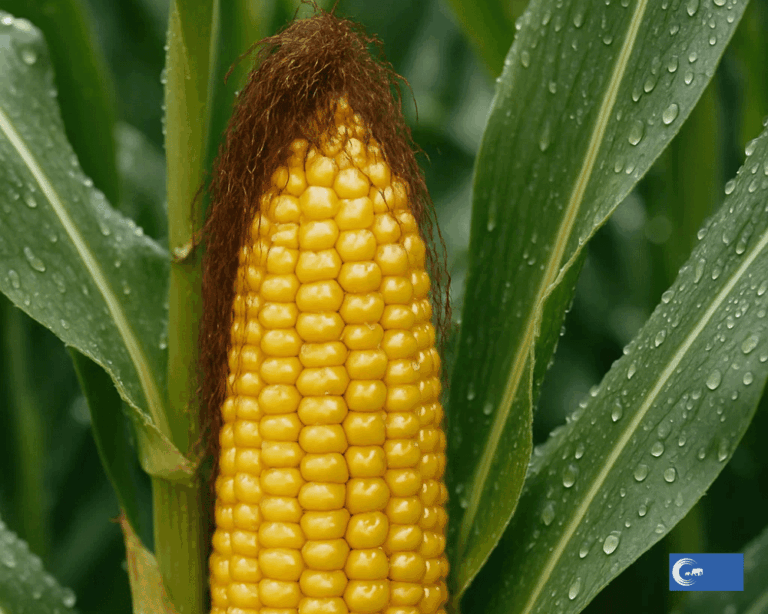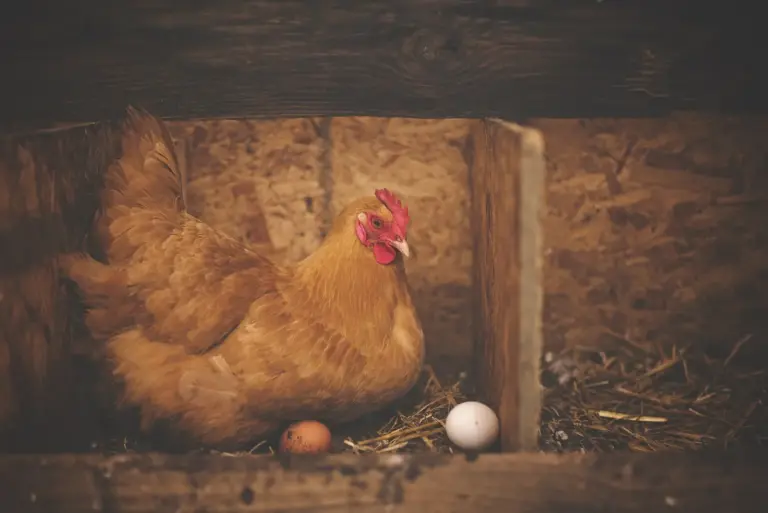When you think about backyard chickens and the bucolic image of a group of poultry grazing happily in a garden, another image comes to mind: The rooster singing very early in the morning at the coming up of the sun.
For some people, but most likely not for expert backyard chicken keepers, this may raise a question: Do hens need a rooster to lay eggs?
The short answer is no. Hens are fully capable of laying eggs without a rooster present.
In fact, commercial egg farms typically do not keep roosters, as fertilization is unnecessary for egg production.
Understanding how hens lay eggs can help clarify this misconception. The ovaries of chickens are very different compared to the reproductive system of mammals.
The egg-laying process begins in the oviduct. Once the yolk of an egg is mature, it is released into the oviduct, where it is encased in egg white, membranes, and finally, a shell. This entire process takes approximately 24 to 26 hours per egg, after which it starts anew.
Main Takeaways
1 . Hens Do Not Need a Rooster to Lay Eggs
Hens lay eggs as a natural part of their reproductive cycle, driven by hormones, not mating.
2 . Unfertilized Eggs Are the Norm in Backyard and Commercial Settings
Most eggs sold for consumption are unfertilized because they are laid without rooster involvement.
3 . Fertilization Requires a Rooster
A rooster must mate with a hen for the egg to be fertilized and potentially develop into a chick.
4 . Fertilized Eggs Can Be Laid Within Days of Mating
After a rooster mates with a hen, fertilized eggs may appear as soon as 24–36 hours later and can continue for up to two weeks.
5 . Roosters Contribute to Flock Dynamics
Roosters help maintain the flock hierarchy, reduce hen aggression, and protect the group from predators.
6 . Egg Formation Is a Hormone-Driven Process
The hen’s body initiates egg production based on light cues and internal hormonal regulation, independent of mating.
7 . Fertilized vs. Unfertilized Eggs: Look and Taste the Same
There’s little difference in appearance or nutritional value between the two—only fertilized eggs can develop into chicks.
8 . Roosters Are Optional but Useful for Breeding
While not required for egg-laying, roosters are essential if you want to hatch your own chicks.

Photo By: svklimkin
Can Hens Lay Eggs Without a Rooster?
Hens can lay eggs without a rooster. The presence of a rooster is not necessary for egg production when eggs are for human consumption.
A rooster is only required for fertilization when the egg is destined for the birth of chicks.
In the absence of a rooster, the eggs laid by hens are unfertilized. These eggs are safe to eat, but they will not develop into chicks if they are placed in incubators or brooded by hens.
Fertilization occurs if a rooster mates with the hen, introducing sperm that can fertilize the egg before the shell forms. Therefore, while roosters are essential for breeding purposes, they are not needed for hens to lay eggs.
Do You Need a Rooster for Hens to Lay Eggs?
While a rooster isn’t necessary for egg production, there are scenarios where having one can be beneficial or even necessary:
- Eggs for Hatching: If you’re interested in breeding chickens or expanding your flock naturally, a rooster is essential to fertilize the eggs.
- Flock Protection: Roosters often act as guardians, keeping an eye out for predators and working as alarms to protect the hens.
- Flock Dynamics: A rooster can help maintain social order within the flock, reducing conflicts among hens.
In chicken flocks, a well-defined social structure, known as the “pecking order,” governs interactions among members. This hierarchy is established through social interactions and determines access to resources like food, nesting sites, and mates.
Roosters often play an important role in maintaining this order. Their presence can stabilize the flock’s social dynamics, reducing aggression and promoting better behaviour among hens. Roosters assert dominance and mediate disputes, helping maintain a balanced and cohesive group structure, which can improve the flock’s welfare and productivity.
However, it’s important to consider potential drawbacks. As already said, the singing of a rooster in the morning is a typical image of rural life. However, in the backyard chicken scenario, neighbours may not appreciate this situation. Increased noise can be a nuisance and lead to complaints.
Another potential risk with roosters is that they can be aggressive. Although they are not dangerous, living with a rooster always on the fence to jump and beak may not be desirable.
In some cases and specific areas, local regulations may restrict the keeping of roosters.
In summary, while hens don’t require a rooster to lay eggs, having one can offer advantages depending on your specific goals and circumstances.

Photo By: Esteban Rodriguez
How Do Hens Lay Eggs Without a Rooster?
Hens lay eggs without a rooster through a natural, hormonally driven reproductive process that doesn’t require fertilization.
A hen’s egg production is regulated by her endocrine system, particularly the hypothalamus and pituitary gland. These glands respond to environmental signals, especially daylight length, to release hormones that stimulate ovulation.
Typically, a hen ovulates and lays an egg every 24 to 26 hours, with the cycle influenced by light exposure.
How do Hen’s Ovaries develop?
The development of the chicken ovary is a complex process that begins early in embryonic life and is marked by a left-right asymmetry not seen in most mammals.
In the chicken embryo, around day 6–7 of incubation, the left gonad begins to differentiate into an ovary, while the right gonad starts regressing.
The left ovary continues to grow and develop a structure with two major layers. This outer layer, called the cortex, contains germ cells (oocytes). This is the site of follicle formation.
The right ovary undergoes apoptosis (cell death) and becomes rudimentary, retaining only a medullary structure. In most female birds, it does not develop further or function in adulthood.
As the chick matures, hormonal signals (like estrogen) help promote the maturation of oocytes. Eventually, follicles grow in size, and the largest one will ovulate — releasing an ovum into the oviduct, where the rest of the egg forms.

Photo By: Steve Buissinne
How Long After Introducing a Rooster Will Hens Lay Fertilized Eggs?
When a rooster is introduced to a flock of hens, fertilized eggs can begin to appear relatively quickly.
The mating process involves the rooster transferring sperm to the hen, which she stores in specialized structures called sperm storage tubules (SSTs) within her reproductive tract. This stored sperm can fertilize eggs over an extended period.
Typically, fertilized eggs may start to appear as soon as 24 to 36 hours after mating, depending on the timing of ovulation and sperm storage. However, it’s more common for fertilized eggs to be consistently produced starting from the second or third day after the rooster’s introduction. Once fertilized, a hen can continue to lay fertile eggs for up to two weeks or more without additional mating, thanks to the sperm stored in her SSTs.
It’s important to note that the exact timing can vary based on factors such as the hen’s reproductive cycle, the rooster’s fertility, and environmental conditions. For those planning to hatch chicks, it’s advisable to wait a few days after introducing the rooster before collecting eggs intended for incubation to ensure fertilization has occurred.

Photo By: Xuân Tuấn Anh Đặng
Conclusion
Hens are fully capable of laying eggs without the presence of a rooster. Egg production is a natural process driven by the hen’s hormonal cycles and is not dependent on fertilization. Therefore, keeping a rooster is unnecessary for those interested solely in collecting eggs for consumption.
However, introducing a rooster to your flock can offer benefits, particularly if you’re interested in breeding or increasing your flock.
A rooster can fertilize eggs, enabling you to hatch chicks and expand your flock naturally. Beyond reproduction, roosters can be useful as protectors, alerting hens to potential predators and maintaining social order within the group. Their presence can reduce conflicts among hens and promote a more cohesive flock structure.
It’s important to weigh these advantages against potential drawbacks. Roosters can be noisy, which might not be suitable for all environments, especially in suburban areas with nearby neighbours. Additionally, some roosters may exhibit aggressive behaviour, which requires careful management. Before deciding to keep a rooster, consider your specific goals, living situation, and local regulations to determine what’s best for your flock.



